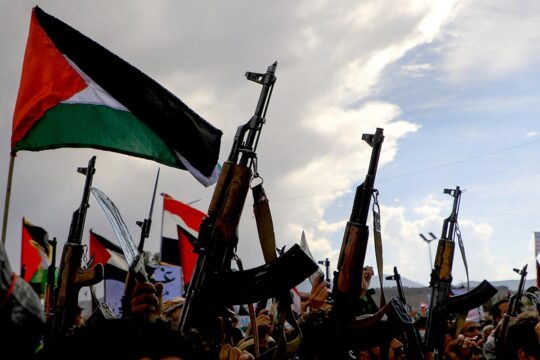Yemen's Huthi militias vowed Monday to avenge the killing of their top political leader in what they said was a Saudi-led coalition air strike, the highest-ranking rebel to die in the three-year conflict.
Saleh al-Sammad, head of the Huthis' supreme political council, was "martyred" last Thursday in the eastern province of Hodeida, the Iran-allied rebels said via their Saba news agency.
Sammad's death is a major blow to the Shiite rebels who have been fighting forces of President Abedrabbo Mansour Hadi backed by a military coalition led by Saudi Arabia.
The most senior rebel to have been killed since the coalition intervened in March 2015, his name was on a Saudi list of 40 Huthi leaders that put bounties on their heads totalling $440 million.
The rebels named Sammad's successor as Mehdi Hussein al-Mashat.
"This crime won't go unanswered," said the Huthis' overall leader, Abdul Malek al-Huthi, adding that six other people were killed in the same raid.
The news came hours after officials in Yemen said dozens of people were killed and wounded in an air raid on a wedding party in the country on Sunday, in another attack the Huthis blamed on the coalition.
Medical sources and local officials put the number of dead between 22 and 33, with at least 40 to 50 wounded, while the circumstances of the raid remained unclear.
Doctors Without Borders tweeted that a hospital it supports in Hajjah received at least 65 patients, including at least 13 children, wounded in the air strikes, which it said were "among the most devastating in the area in recent months".
- Iran denounces 'invaders' -
Rescue teams said the wedding was being held in the Huthi-controlled Bani Qais area of Hajjah province, north of Sanaa, when jets carried out the raid.
A local official said at least 23 civilians, including women and children, were killed.
The official, speaking to AFP on condition of anonymity, said a double air strike on the venue had left a number of bodies buried beneath the rubble.
Huthi-run television said at least 33 people, including women and children, were killed and as many as 55 people wounded.
The coalition's spokesman Colonel Turki al-Malki said they were following media reports of the bombing, and will investigate the allegations.
Iran, which is accused of supplying arms to the Huthis, swiftly condemned the raid.
"The escalated bombardment of residential areas proves the desperation and inability of the invaders in achieving their goals," foreign ministry spokesman Bahram Qassemi said.
Also on Monday, the coalition said it downed two new ballistic missiles fired by the Huthis, who claimed to target facilities belonging to the kingdom's oil giant Aramco in southern Jizan city.
The coalition reported no damage or loss of life from the strikes, the latest in a string of bombardments on Saudi Arabia by the Huthis.
Saudi forces said they intercepted a rebel ballistic missile targeting its southern border city of Najran on Sunday, which set a farm ablaze, after another aimed at Jizan was shot down on Friday.
- 'Year of ballistics' -
At the beginning of April, Huthi political head Sammad dubbed 2018 "the year of ballistics", referring to cross-border missile attacks.
Sunday's deadly strike in Hajjah was one of a series to have struck weddings in Yemen's conflict, which has killed nearly 10,000 people and wounded 54,000 others since March 2015.
In late 2015, coalition air strikes on two wedding parties in northern Yemen killed at least 159 civilians.
Violence has also hit funerals. In October 2016, 140 mourners were killed in an air strike on a house in Sanaa.
Elsewhere in Yemen on Monday, five pro-government soldiers were killed and 19 wounded in clashes with jihadists in the southern city of Taez, medics said.
Fighting in the city's Jahmaliah district came after the governor of Taez launched an operation against jihadists he suspected were behind the murder of a Red Cross aid worker over the weekend.
The Lebanese aid worker, Hanna Lahoud, was shot dead in Taez on Saturday by unidentified assailants who sprayed his Red Cross vehicle with bullets.
President Hadi's government was driven out of Sanaa in 2014 by the Huthis, who still control the capital and much of northern Yemen.
Nearly 10,000 people have been killed since the coalition's intervention three years ago, triggering what the UN has called the world's largest humanitarian crisis.
jj-oh-sh-ac/ceb



